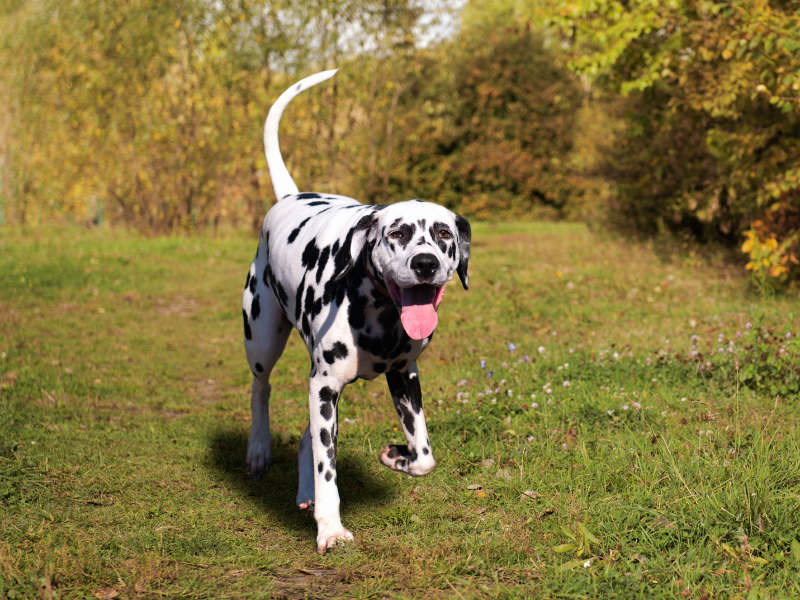Dalmatians, with their distinctive spots and elegant gait, are often associated with firehouses and family pets. However, did you know that these lovable dogs also have a history as hunting companions? While not commonly known, Dalmatians have proven to be versatile and skilled hunters in certain contexts.
Dalmatians have a rich history as hunting dogs. Originally bred in Croatia, they were primarily used to hunt small game. Their agile and athletic build, coupled with their keen sense of smell and high energy levels, make them well-suited for tracking and flushing out prey. While their hunting prowess may not rival that of specialized hunting breeds, Dalmatians can still be effective hunting companions, especially in certain terrains or game types. Their endurance and stamina, combined with their intelligence and eagerness to please, make them adaptable to various hunting situations. So, if you’re looking for a versatile hunting partner with a unique appearance, don’t overlook the Dalmatian!
Dalmatians are not typically used as hunting dogs due to their origins as carriage dogs and their friendly, non-aggressive nature. While they are known for their energy and athleticism, they lack the strong hunting instinct and specialized skills of breeds like Labradors or Beagles. However, Dalmatians can excel in dog sports and activities that involve agility, obedience, and endurance. They make great companions for active individuals and families.

Do Dalmatians Make Good Hunting Dogs?
In this article, we will explore the question of whether Dalmatians make good hunting dogs. Dalmatians are best known for their unique spotted coat and playful demeanor, but many people wonder if they possess the skills and instincts required for hunting. We will delve into the characteristics of Dalmatians, their history, and their suitability for various types of hunting.
1. The Origins and History of Dalmatians
The history of Dalmatians as hunting dogs dates back centuries. Originally from the coastal region of modern-day Croatia, Dalmatians were bred to assist humans in various tasks, including hunting. They were especially adept at trailing game, guarding livestock, and even hunting small game like birds and rodents.
However, as time went on, the role of Dalmatians in hunting diminished, and they became more commonly known as carriage dogs and companions. Today, while they may not be as well-known for their hunting abilities, Dalmatians still retain some of their innate instincts that make them quite capable in the field.
It’s important to note that not all Dalmatians are suited for hunting. The breed has evolved over time, and certain characteristics may be more emphasized in some individuals than in others. Nevertheless, with the right training, environment, and guidance, Dalmatians can still fulfill their hunting potential.
2. The Traits and Abilities of Dalmatians
Dalmatians possess several traits and abilities that can contribute to their potential as hunting dogs. First and foremost, they are highly energetic and have a strong work ethic. These dogs have a natural inclination to be active and are always ready to engage in physical activities.
In addition, Dalmatians have excellent endurance and can cover long distances without tiring easily. This stamina is especially beneficial in hunting scenarios that require persistent tracking or following game over vast areas. Their sharp senses and heightened alertness make them keen observers, allowing them to detect subtle scents or movements in their surroundings.
Moreover, Dalmatians have a friendly and sociable nature, which can make them well-suited for hunting in groups or as part of a team. They are known to work well with other dogs and humans, and their cooperative spirit ensures efficient collaboration during hunting expeditions.
3. Hunting with Dalmatians: Practical Applications
While there are certain hunting activities where Dalmatians may not excel, there are others where their unique characteristics shine. Here are a few examples of hunting scenarios in which Dalmatians can be highly valuable:
Upland Bird Hunting:
Dalmatians’ keen eyesight and athleticism make them great assets in upland bird hunting. They can spot birds from a distance and possess the agility to navigate through varying terrains.
Small Game Hunting:
Dalmatians have a strong prey drive and can be particularly effective in hunting small game such as rabbits, squirrels, and raccoons. Their alertness and speed give them an advantage in pursuing and capturing these elusive animals.
Tracking:
Due to their exceptional sense of smell and tracking abilities, Dalmatians can excel in tracking wounded game. Their persistence, endurance, and attention to detail make them valuable assets when it comes to locating injured animals during a hunt.
Scouting and Guarding:
Although not directly involved in the act of hunting, Dalmatians’ sharp vision and territorial instincts can make them excellent scouts and guards in hunting camps. They can alert their human companions to the presence of potential danger or approaching game.
Training Tips for Dalmatians as Hunting Dogs
When considering training a Dalmatian for hunting, it’s important to keep in mind a few essential tips to ensure success:
1. Start with Basic Obedience Training:
Before introducing hunting-specific training, ensure that your Dalmatian has a solid foundation in basic obedience commands such as sit, stay, come, and heel. This will establish a level of control and discipline that is crucial in hunting situations.
2. Introduce Scent Work:
Dalmatians have a strong sense of smell, making scent training an important aspect of their hunting preparation. Gradually expose them to different scents associated with your desired hunting targets, and reward them for tracking and locating those scents.
3. Gradual Exposure to Hunting Scenarios:
Expose your Dalmatian to hunting scenarios in a gradual and controlled manner. Start with calmer environments and gradually introduce them to the sights, sounds, and smells they will encounter in the field. Be patient, and allow them to adapt and build confidence at their own pace.
4. Socialize with Other Dogs and Hunters:
Socialization is crucial for Dalmatians to become comfortable working alongside other dogs and hunters. Provide opportunities for them to interact with other dogs and take part in group training sessions to simulate real-world hunting scenarios.
5. Seek Professional Guidance:
If you are new to training hunting dogs or have any concerns, consider seeking guidance from professional trainers who specialize in working with Dalmatians or other hunting breeds. They can provide invaluable expertise and advice tailored to your specific needs.
Health Considerations for Hunting Dalmatians
When engaging your Dalmatian in hunting activities, it’s important to take their health into consideration. Here are a few key health considerations for hunting Dalmatians:
1. Endurance and Stamina:
Dalmatians have excellent endurance and stamina, but it’s essential to gradually build their physical fitness to prevent injuries. Start with shorter hunting sessions and gradually increase the duration as your dog becomes more conditioned.
2. Protect Against Harsh Weather:
During hunting trips, harsh weather conditions can pose risks to your Dalmatian’s health. Be mindful of extreme temperatures, whether hot or cold, and ensure that your dog has access to shade, water, and protective gear when necessary.
3. Tick and Flea Prevention:
When hunting in wooded or grassy areas, Dalmatians can be exposed to ticks and fleas. Regularly check your dog for these parasites and consider using preventative treatments to protect against infestations and the potential transmission of diseases.
4. Muscle and Joint Health:
Hunting activities can be physically demanding for Dalmatians, so it’s important to prioritize their muscle and joint health. Provide a well-balanced diet, engage in appropriate exercise, and consider joint supplements to support their overall musculoskeletal well-being.
Conclusion
While the role of Dalmatians as hunting dogs has changed over time, these energetic and adaptable canines still possess many qualities that make them valuable assets in various hunting scenarios. With the right training, environment, and guidance, Dalmatians can excel in upland bird hunting, small game hunting, tracking, and scouting, among other activities. However, it’s important to remember that not every Dalmatian will have the same hunting prowess, so individual temperament and aptitude should always be taken into account. By understanding their origins, traits, and training tips, you can maximize the potential of Dalmatians as hunting companions while ensuring their health and well-being.
Key Takeaways: Do Dalmatians Make Good Hunting Dogs?
- Dalmatians were originally bred to be carriage dogs, not hunting dogs.
- While Dalmatians have high energy levels, they may not possess the natural hunting instincts needed for successful hunting.
- Dalmatians are more suited for activities like running, hiking, and playing fetch than hunting.
- If you’re looking for a hunting dog, consider breeds specifically bred for that purpose, like pointers, retrievers, or hounds.
- Remember to always choose a dog breed that matches your lifestyle and interests.
## Frequently Asked Questions
Dalmatians are commonly known for their distinctive spots and playful personalities. However, many people wonder if they make good hunting dogs. Here are some frequently asked questions about Dalmatians and their suitability for hunting:
1. What are the natural instincts of Dalmatians when it comes to hunting?
Dalmatians have a history of being bred for various purposes, including hunting. While they may not be traditionally used for hunting game, they do possess some natural instincts that can make them decent hunting companions. Dalmatians have a good sense of smell, excellent endurance, and a keen eye for spotting movement. These characteristics can be advantageous when it comes to tracking and chasing prey.
However, it’s important to note that the specific hunting skills and drive can vary from dog to dog. Some Dalmatians may have a stronger inclination to hunt, while others may be more interested in other activities. Proper training and exposure to hunting environments can help bring out their natural instincts and enhance their hunting abilities.
2. Can Dalmatians be trained to become effective hunting dogs?
Yes, Dalmatians can be trained to become effective hunting dogs with the right approach and proper training methods. While they may not possess the same innate hunting abilities as some other breeds, their intelligence and enthusiasm for learning can make them suitable candidates for hunting training.
When training a Dalmatian for hunting, it’s important to start early and use positive reinforcement techniques. They respond well to rewards-based training, where treats and praise are used to reinforce desired behaviors. It’s also crucial to expose them gradually to the sights, sounds, and scents of a hunting environment.
Additionally, working with professional trainers who have experience with Dalmatians or hunting dogs in general can provide valuable guidance and ensure that the training process is effective and safe. Remember, consistency, patience, and a nurturing approach are key when training Dalmatians for hunting.

The truth about Dalmatians | Beautiful dog breed
Summary
So, do Dalmatians make good hunting dogs? In short, the answer is no. Despite their athletic build and historic association with firehouses, Dalmatians are not natural hunters. Their genetic makeup and temperament make them better suited for other activities, such as companionship and agility training. While every dog is unique, it’s important to understand a breed’s characteristics before choosing a hunting partner.
If you’re looking for a hunting dog, it’s better to consider breeds that have been specifically bred for hunting instincts and skills. Breeds like Labradors, Beagles, and German Shorthaired Pointers are more likely to have a love for the chase, a strong sense of smell, and the stamina needed for a successful hunting expedition. Remember, it’s crucial to choose a dog that matches your needs and lifestyle. Happy hunting!
